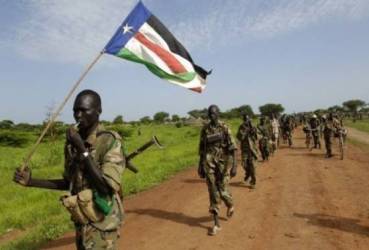South Sudan withdraws 700 police from Abyei
May 10, 2012 (JUBA) – South Sudan said on Thursday it has withdrawn a significant number of its police forces from the contested border region of Abyei, apparently in compliance with the United Nations Security Council (UNSC) resolution endorsing recommendations from African Union’s Peace and Security Council (AUPSC) to prevent further conflict between the ten-month-old country and Sudan.

“I witnessed today the event marking redeployment of 700 police service out of Abyei,” Luka Biong Deng, the South Sudanese Co-Chair of the Abyei Joint Oversight Committee told Sudan Tribune on Thursday.
He said the event was to comply and implement the decision of the cabinet resolution which approved withdrawal of the South Sudan police forces from the contested border region of Abyei in compliance with the UNSC resolution 2046, which asked both country’s to withdraw from the area within two weeks.
The event, he said, was attended by the commander of the United Nations Interim Security Force for Abyei, General Tadese Werede Tasfey and Inspector General of South Sudan Police Service, General Acuil Tito. Other officials who attended the event included Acting Chief Administrator and traditional leaders from the area.
Abyei was to have held a referendum to decide whether it would join South Sudan or remain north of the border in January 2011. Disagreement over who could vote has meant that the plebiscite has been delayed indefinitely with Juba insisting that the southern-aligned Dinka-Ngok are the only group resident in the area, while Khartoum maintains that the nomadic Misseriya tribe who enter the region with their cattle for much of the year should also be accorded full voting rights.
In May 2011 Abyei was forcibly occupied by the Sudan Armed Forces (SAF), displacing over 100,000 people, most of which are yet to return, in response to an attack on a convoy leaving the area.
Senior officials of the South Sudan’s governing Sudan People’s Liberation Movement (SPLM) expressed disappointment over the apparent reluctance of Sudanese government to consider withdrawing from Abyei despite the 16 May deadline given by the UNSC and the African Union.
South Sudan’s announcement that it would withdraw from Abyei came shortly after it withdrew from Heglig, another disputed area adjacent to Abyei after occupying it for 10 days in April.
Much of the Sudan-South Sudan border has not been demarcated and various areas are claimed by both countries. Fighting over the oil-rich Heglig area raised fears of a return to all-out war and drew strong international condemnation.
Juba has complained that the criticism it received was stronger than the rebuke given to Khartoum for occupying Abyei last year and various air attacks on South Sudanese territory. Khartoum accuses South Sudan of backing rebels in its territory.
Biong said some “criminals” from the Misseriya were stealing cattle from some members of the Dinka Ngok who have returned to areas North East of Abyei town.
“By the time our police forces are being redeployed, the cattle of Ngok Dinka are being stolen by some criminals from Arab nomads and Sudan has not shown any sign of redeploying its forces from Abyei area,” said Biong.
He, however, said the Ethiopian peacekeeping forces of the United Nations have managed to retrieve some of the stolen cattle but that a lot remain to be traced and recovered.
(ST)
